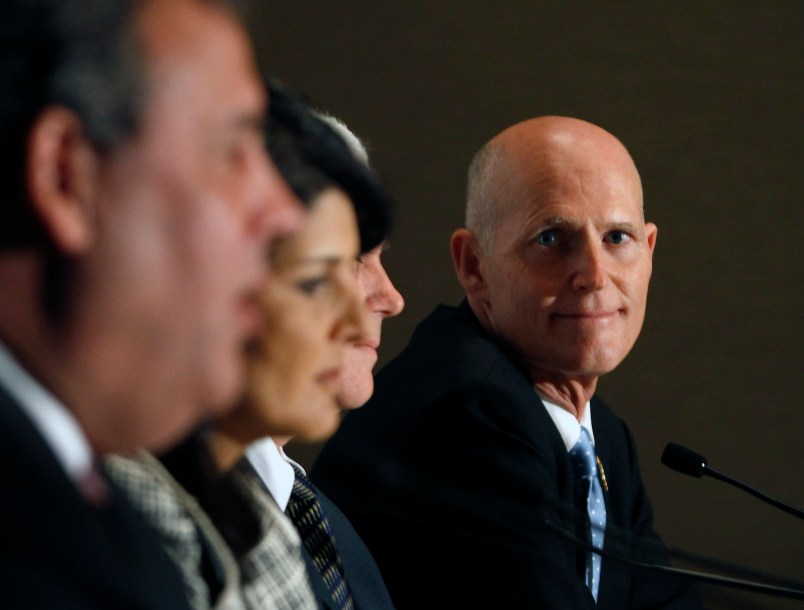There are growing signs at the state level that key health care industry players in the push to expand Medicaid under Obamacare are calling it quits for now, pessimistic about getting new legislation passed in the current political environment.
Support for Medicaid expansion from within the health care industry — in particular from providers like hospitals, doctors and nursing homes — is a key part of the coalition that Obamacare advocates have hoped will help eventually turn the tide in the non-expanding Republican-dominated states.
But top officials for powerful trade organizations in three of the largest states not expanding Medicaid under Obamacare told TPM that they have effectively given up that fight until political conditions change, setting their sights on 2015 at the earliest.
“What I’m really struggling with is — I don’t even know how to talk about expanding Medicaid without just pissing Republicans the hell off and making them think I’m part of the problem,” said a top official for one of the industry groups, who spoke on the condition of anonymity to talk frankly about the political reality in their state and avoid upsetting the chances of expansion in the long term.
“It just isn’t going to happen,” the official continued. “The more you talk about Medicaid expansion, the more you’re talking about Obamacare, the more you’re talking about Obama, the more you’re talking about a problem. Frankly, the more we talk about it, I think the more entrenched they get that it’s not something that they’re going to do.”
The biggest target for Obamacare supporters — Texas and its more than 1 million people in the Medicaid expansion gap — is off limits for the next year anyway because the biennial legislature doesn’t reconvene until 2015. But there, too, one of the top trade groups, the Texas Hospital Association, is taking some time to figure out a new approach to the issue after failing to convince its Republican leadership to agree to expansion in 2013.
“This is one of those situations that makes it politically difficult to maneuver,” Lance Lunsford, a spokesman for the association, told TPM. “I don’t know what path we take now.”
It’s a stark reminder for Obamacare advocates that, while the White House is pushing hard for expansion and supporters are mobilizing those left out of the Medicaid expansion to lobby their state lawmakers, they’re still fighting an uphill battle. Convincing Republican politicians to endorse President Obama’s signature legislative achievement in an election year is going to be a tough sell.
“It’s probably a phase of exhaustion,” Linda Blumberg, a health policy expert at the Urban Institute, who previously noted how influential those lobbying interests could be in the Medicaid expansion debate, told TPM. “My guess is everybody is taking a breath and regrouping. I don’t think that means that they’ve given up the fight permanently.”
The political rationale for these groups seems pretty simple: Republican leaders are steadfast in opposing Obamacare and so lobbying them to buy into the law could end up only antagonizing them and making them more resistant to expansion in the long term. There’s also the reality of state and national elections in 2014 where the health care reform law could be a key dividing point.
These organizations approached Medicaid expansion as a typical legislative issue last year — the kind where the promise of billions in federal dollars and opportunity to insure thousands of your constituents would trump ideological purity. But as national political leaders and political committees with money to spend applied the pressure, many state officials ultimately held to the national party line. That blanket opposition, which seems likely to intensify during next year’s election cycle, has superseded all other variables during the expansion debate.
“We found that this issue is much bigger than that. The influences are much stronger than a state-derived influence in terms of keeping states in the ‘No’ column,” a trade group official in a third state said. “We can’t even call it Medicaid expansion here. That’s a politically incorrect way of saying it.”
Their best hope, the officials said, is that either a new party in charge of the state’s government or a change in attitude during an election off-year will open a new opportunity for expansion in 2015.






